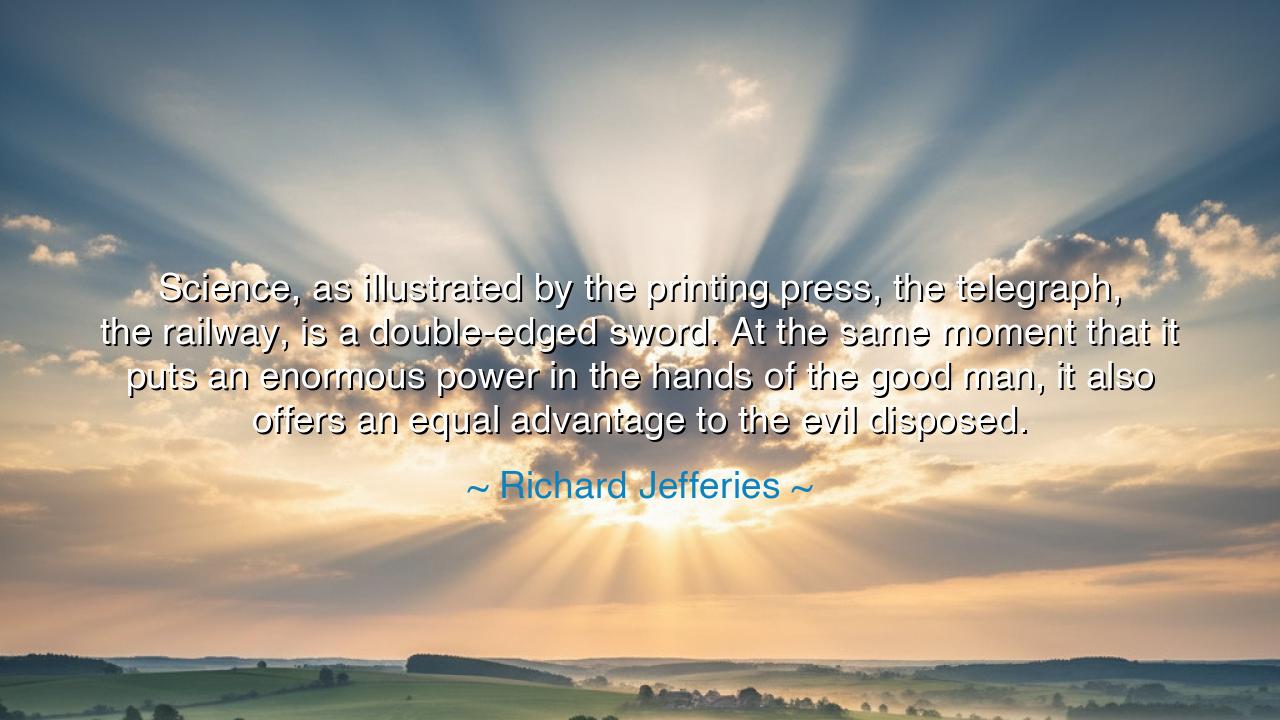
Science, as illustrated by the printing press, the telegraph, the
Science, as illustrated by the printing press, the telegraph, the railway, is a double-edged sword. At the same moment that it puts an enormous power in the hands of the good man, it also offers an equal advantage to the evil disposed.






Hear this, O children of the earth, for the words of Richard Jefferies are filled with a truth that transcends time, a wisdom that rings through the ages. "Science, as illustrated by the printing press, the telegraph, the railway, is a double-edged sword. At the same moment that it puts an enormous power in the hands of the good man, it also offers an equal advantage to the evil disposed." In these words, Jefferies speaks of the power that science gives to humankind—a power that is both a gift and a curse. The very inventions that have lifted us to new heights of understanding and progress—the printing press, the telegraph, the railway—have the potential to change the world for the better, yet they also hold the capacity to bring about great harm. Science does not choose its champions; it is neutral, and it is in the hands of those who wield it that its true nature is revealed.
Reflect upon the printing press, that great invention that transformed the world by making knowledge accessible to all. With it, the words of the wise could travel across the lands, reaching those who had never before encountered the teachings of great philosophers and scientists. The printing press gave birth to the Renaissance, the Enlightenment, and the Age of Reason, spreading the light of knowledge and wisdom far and wide. But, O children, as Jefferies warns, the printing press was also a tool that could spread lies, propaganda, and hatred. The same press that brought truth to the masses could also be used to distort it, to control minds and manipulate souls. The power of the printing press was not inherently good or evil—it was the intent of those who used it that determined its effect.
Think, too, of the telegraph, which bridged the great distances between people, allowing messages to travel faster than ever before. The telegraph brought the world closer together, allowing for the rapid exchange of information and the speeding up of trade, communication, and diplomacy. It was a tool of progress, a symbol of the great potential of science to unite the world in ways once thought impossible. And yet, the telegraph also made it easier for war and conflict to spread. The same communication that brought nations together could also be used to spread discord and misunderstanding. Science, in this case, offered its gifts without discrimination, and it was up to the minds of those who used it to decide how it would be wielded.
In the same way, the railway—that marvel of engineering—allowed mankind to travel across great distances, to transport goods and ideas with unparalleled speed. It opened up the world, connecting cities and nations in ways that had never been done before. The railway transformed the world into a global village, fostering commerce, exchange, and understanding. But, O children, it was also a tool that could be used to oppress, to bring industrial control, and to further the interests of those who sought power through exploitation. Railways could carry not just goods, but armies, and they could be used to transport not just supplies, but injustice and inequality. The science behind the railway did not choose its course—it was the people who directed it, who decided how the power it offered would be used.
Consider, then, the story of Adolf Hitler and the Third Reich, where science—in the form of telecommunications, engineering, and mechanical innovations—was used to control, to manipulate, and to destroy. The same telegraph that brought messages of hope could be twisted to spread hate. The railway that could bring progress and unity was used to transport millions of innocent souls to their deaths in the concentration camps. Science and technology, in the hands of the evil disposed, were wielded as instruments of oppression and violence. This dark chapter in history shows us the terrifying power that science can hold when it is not guided by a moral compass.
So, O children, what lesson do we take from Jefferies' wisdom? The power of science is not inherently good or evil. It is a tool, a force that magnifies whatever is within the hearts of those who wield it. Science gives us the ability to create, to build, and to progress, but it also gives us the ability to destroy, to control, and to manipulate. In the hands of the good man, it can heal, it can unite, and it can illuminate the darkest corners of the world. But in the hands of the evil disposed, it can bring untold suffering, chaos, and fear. We must understand, then, that science is not a neutral force—it is a reflection of the intentions and values of the one who holds it.
Let us, therefore, O children, use the power of science wisely. Let us imbue it with the strength of virtue, with a commitment to justice, compassion, and truth. Let the tools of progress—whether they be the printing press, the telegraph, or the railway—serve the cause of humanity, not its destruction. We must strive to be the good men and women who wield these tools not for personal gain, but for the betterment of all. Science, in the end, is not about the machines or the methods—it is about the hearts of those who shape the world with it. Let those hearts be full of wisdom, and let the world be shaped in the image of peace, justice, and love.






AAdministratorAdministrator
Welcome, honored guests. Please leave a comment, we will respond soon